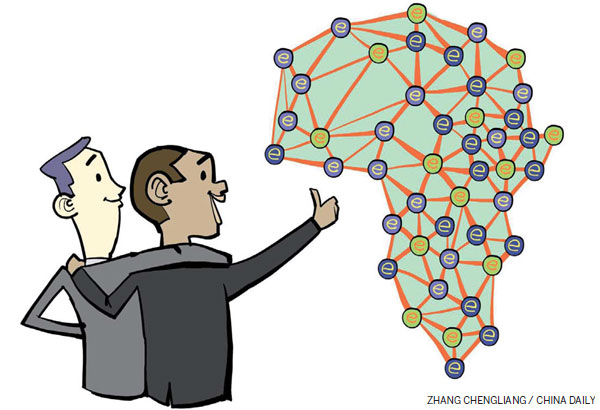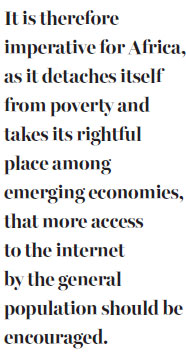Logging on to a more prosperous future

Renowned linguist George Lakoff once said that if someone asked you not to think about an elephant, your mind would immediately start summoning up the bulkiness, grayness and trunkiness of an elephant.
The situation is no different with China, home to the largest human population of any country, at more than 1.4 billion people. In line with Lakioff's theory, thoughts of technologically advanced sectors - especially those involving internet access - would definitely cross a majority of people's minds when someone mentions industry.
True to the concept of former Central Party School vice-president Zheng Bijian - zhongguohepingjueqi, or China's peaceful rise - the country has emerged from the shadows to become a powerhouse in the global internet industry, despite its late entry into the fold.

It was only in 2014 that China marked the 20th anniversary of accession to the internet, while some in the US were already using a form of the internet as early as 1960.
By the end of the 2014, however, China alone had 649 million netizens, accounting for 65 percent of its population and about one-fifth of global netizens. In the US that year, internet access stood at 87.4 percent of the population.
Even emerging economies - such as Russia, Malaysia, Turkey and Brazil - now have at least 60 percent internet access penetration.
Today, China has over 720 million mobile internet subscribers, a situation that has been fueled by the growing smartphone sector.
Take smartphone maker Xiaomi as an example: The company is the largest vendor in China. As of 2015, it was fourth globally in units shipped, with projections showing it was bound to take over as No 1 globally.

To further underline China's global dominance of the internet industry, four of the world's top 10 internet companies are Chinese. Alibaba, founded in 1999 by Jack Ma, still holds the world record of having the largest initial day global IPO at $25 billion (23.7 billion euros; 20.3 billion) when it was listed on the New York Stock Exchange - a feat that surpassed the 2010 IPO of the Agricultural Bank of China ($22.1 billion) on the Hong Kong Stock Exchange. The Hangzhou-based company began trading with shares opening at more than 35 percent above the $68 IPO price.
WeChat, a Chinese cross-platform social media service from Tencent Holdings, had more mobile transactions over the Chinese New Year than PayPal had in the whole of 2015. This illustrates the pervasive penetration of internet access in the country. China also remains the world's undisputed leader in the manufacture and exportation of ICT equipment, which translates to cheaper local network access and making the internet accessible to more people.
Africa should therefore look no further than China in its quest to grow internet access across the continent. Greater access will help the continent grow both socially and economically as it increases productivity while contributing immensely to GDP. Internet penetration also helps connect more people to markets, encourages innovation platforms and of course raises a population's access to government services.
Countries with greater internet access are characterized by lower poverty levels, while those with low internet access are poorer, more often than not. However, a strong correlation between the two variables does not explicitly imply causation.
At the same time, the data also indicate that internet connectivity stimulates economic growth. It is therefore imperative for Africa, as it detaches itself from poverty and takes its rightful place among emerging economies, that more access to the internet by the general population should be encouraged.
One way Africa can engage China on this front is by actively and aggressively collaborating with leading Chinese technology and telecommunication players such as Huawei Technologies and ZTE Telecom, which already have a footprint on the continent.

Other telecommunication giants include China Telecom and Alcatel Shanghai Bell, both of which specialize in the production of low-cost ICT and mobile equipment, as well as network infrastructure. Once engaged, these firms will massively increase access to internet equipment and mobile devices, such as smartphones, at lower cost. With an increase in the access of smartphones for example, more users in Africa will engage the internet - a scenario that will in turn raise internet access on the continent.
With the modernization of agriculture and improvements in infrastructure as elements of President Xi Jinping's "Ten cooperation plans with Africa", Chinese telecommunication players should see greater access to subsidized state loans as they seek to venture into Africa with expanded operations. This would make them more attractive and give them an edge over independent telecommunication companies, which now appear pricey.
China also stands to benefit through this arrangement, as it can counter Western influence in Africa and have access to new export markets for its telecommunication and ICT equipment, a situation that will help its fast expanding economy.
African governments should also encourage Chinese companies to develop global innovation hubs in their respective capitals that will tap into the innovative wealth of many educated but unemployed youths. This will ensure that innovations are nurtured, while at the same time creating employment opportunities.
With a rise in technological innovations, awareness of the importance of the internet will be aroused and wider access will be achieved in both urban and rural populations.
With more youths being employed and new innovative startups being launched, steady - and unprecedented - economic growth for Africa can be expected.
The author is a PhD student at Kenyatta University in Nairobi and a contributor to China Daily. The views do not necessarily reflect those of China Daily.
(China Daily Africa Weekly 01/06/2017 page10)
Today's Top News
- Xi hears report from Macao SAR chief executive
- Xi hears report from HKSAR chief executive
- UN envoy calls on Japan to retract Taiwan comments
- Innovation to give edge in frontier sectors
- Sanctions on Japan's former senior official announced
- Xi stresses importance of raising minors' moral standards





























